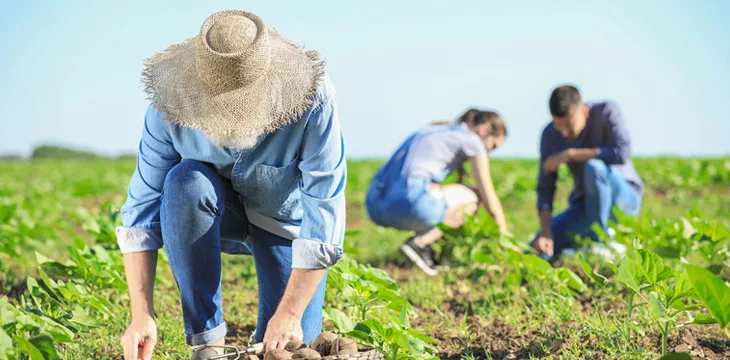|
Getting your Trinity Audio player ready...
|
“Data is as valuable as the crops themselves.” That phrase sums up the role technology plays in the agricultural sector as farmers grapple with new challenges. Even the word “farming” itself is being replaced by others like “agribusiness” and “AgriTech.” Where data is important, blockchain is essential. To explain the hows and whys of this, the BSV Blockchain Association has published a new ebook by Bryan Daugherty titled “Revolutionising Agriculture in the Digital Age,” available as a free download right now.
Blockchain and agriculture can form a ‘synergetic relationship’
Agriculture has always been a science, but for thousands of years, it has existed in the form of traditions and knowledge gained from practical experiences passed down through generations of farmers. In the search for ever-greater efficiencies and from the availability of new technologies, concepts like “precision farming,” IoT, Big Data analytics, sustainability, and resource-scarcity, and robotics have entered the field—along with a few others you wouldn’t immediately expect, like cybersecurity, transparency, and even “democratization of data.”
Technology has mitigated problems related to distance, transportation, and supplies, which have always affected agriculture. However, the modern world has also raised new ones like access to/scarcity of resources, energy efficiency and availability, and requirements to reduce any negative impacts on the environment.
Farmers of the future won’t wake in the morning to discover a fox has been in the chicken house. They’ll hear about it and take steps to deal with it the second it happens. They’ll also have the latest information about chicken health and optimal nutrition for better yields, find out instantly if there are any disease threats and how to manage them, know the latest egg/meat prices worldwide, automate egg collection and bird grading, and mark all product for tracking as it changes hands until it reaches the end consumer (there’s no word on how foxes will fare in this world, but that’s a problem for foxes).
Agricultural challenges: the ones you know, and the ones coming soon
Daugherty’s ebook, an easy read at just 23 pages, presents a list of challenges and problems facing farmers today and into the future—with accompanying solutions blockchain technology can provide.
It covers topics like supply chain integrity, access to credit and financial inclusion, climate and weather prediction, disease control and pest management, local adaptability, and efficient energy use.
Blockchain offers Big Data analytics and reliable meteorological data (in both gathering and supplying information), better peer-to-peer finance/lending options, and IoT device networks to track various food ingredients all the way down the chain from farm to plate. In cases where farmers themselves are the end consumers (supplies, equipment, feed, fertilizers, etc.) they’ll also be able to track those products back to their sources.
A globally scalable blockchain like BSV is capable of storing volumes of data equivalent to today’s internet, as well as all data added to the compendium of human knowledge for centuries into the future.
The phrase “data integrity” is important here (as it should be anywhere) because that’s what storing information on a blockchain network is really all about. And that’s becoming ever more important as data and the ability to analyze it in creative and useful ways come to dominate all industries. All data from all sources must be accurate, reliable, immutable, and accessible. The BSV blockchain adds data to the permanent record in transactions confirmed by decentralized networks of processors (or “miners”). This “universal ledger of truth” is controlled by no one party or authority and remains open and accessible to anyone who can interface with it.
Daugherty’s book describes “robust blockchain systems acting as unbreakable digital silos,” which can share knowledge and wisdom gained from farmers and those providing new technologies to them, as well as securing that information against breaches and other cybersecurity threats facing other industries.
Farming is not easy. Any farmer will be happy to tell you that. It was true even before the digital era, and even technology’s new efficiencies forced farmers to become up-to-the-second experts in additional fields like security, markets, automation, regulation, and ecology. Blockchain can’t make these issues disappear, but it can make managing them more bearable.
Watch: BSV’s scaling will change governance, banking, agriculture

 07-03-2025
07-03-2025 





